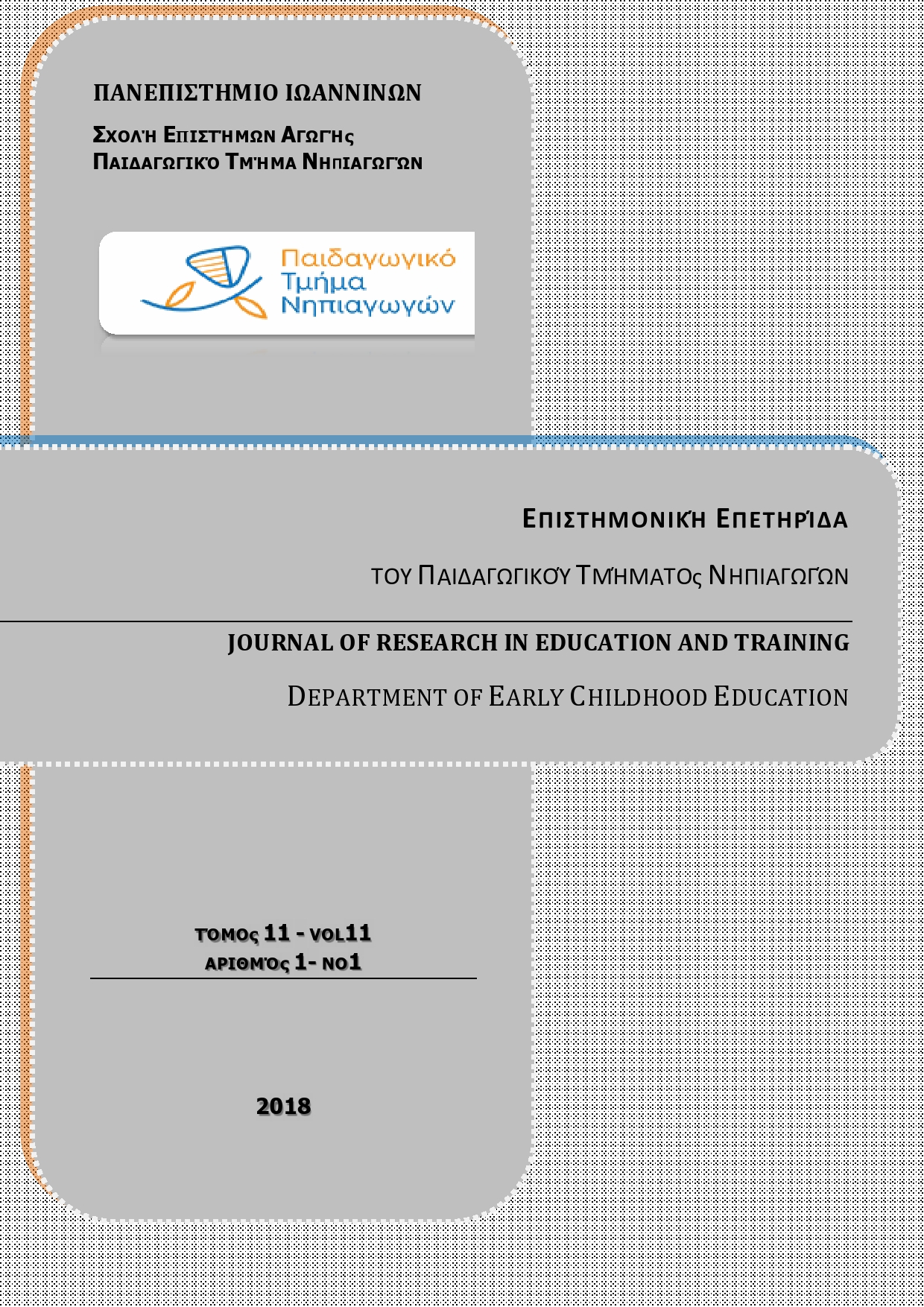Τι λύσεις προτείνουν τα νήπια για τα περιβαλλοντικά προβλήματα η περίπτωση της σπατάλης της ηλεκτρικής ενέργειας

Περίληψη
Το θέμα της ενέργειας και της χρήσης της αποτελεί ένα υψίστης σημασίας σύγχρονο ζήτημα με κοινωνικές, περιβαλλοντικές και οικονομικές επιπτώσεις. Η σχολική εκπαίδευση οφείλει να διαδραματίσει καθοριστικό ρόλο στην επίτευξη της εξοικονόμησης της ενέργειας με στόχο τη βιωσιμότητα των σύγχρονων κοινωνιών. Στόχος της παρούσας έρευνας ήταν να ανιχνεύσει τις σκέψεις μαθητών νηπιαγωγείου, υπό τη μορφή αντιλήψεων και νοητικών μοντέλων, σχετικά με τους συλλογικούς και τους προσωπικούς τρόπους εξοικονόμησης της ηλεκτρικής ενέργειας και ταυτόχρονα, να διερευνήσει την πιθανή σχέση ανάμεσα στους συλλογικούς και προσωπικούς τρόπους εξοικονόμησης που οι συγκεκριμένοι μαθητές προτείνουν. Στην έρευνα συμμετείχαν 27 μαθητές (6 ετών) από δύο δημόσια νηπιαγωγεία του νομού Μαγνησίας. Η ανάλυση των δεδομένων, σχεδίων και ατομικών συνεντεύξεων με τη βοήθεια εποπτικού υλικού, δείχνει ότι στη σκέψη των μαθητών του δείγματος κυριάρχησαν δύο βασικά νοητικά μοντέλα: το ένα μοντέλο αφορά σε συγκεκριμένες και άμεσες ενέργειες, όπως το σβήσιμο της τηλεόρασης όταν δεν βλέπει κάποιος και το άλλο μοντέλο αφορά σε γενικότερες προληπτικές ενέργειες, οι οποίες μακροχρόνια συμβάλουν στην εξοικονόμηση της ηλεκτρικής ενέργειας. Επιπλέον, φαίνεται από τα αποτελέσματα ότι τα δύο αυτά είδη σκέψης αλληλοσυνδέονται. Τέλος, στην παρούσα εργασία συζητιούνται σημαντικές επιπτώσεις και προτάσεις για τη διδακτική πρακτική.
Λεπτομέρειες άρθρου
- Πώς να δημιουργήσετε Αναφορές
-
Ηλιοπούλου Ι. (2018). Τι λύσεις προτείνουν τα νήπια για τα περιβαλλοντικά προβλήματα: η περίπτωση της σπατάλης της ηλεκτρικής ενέργειας. Επιστημονική Επετηρίδα Παιδαγωγικού Τμήματος Νηπιαγωγών Πανεπιστημίου Ιωαννίνων, 11(1), 77–102. https://doi.org/10.12681/jret.14137
- Τεύχος
- Τόμ. 11 Αρ. 1 (2018)
- Ενότητα
- Άρθρα

Αυτή η εργασία είναι αδειοδοτημένη υπό το CC Αναφορά Δημιουργού – Μη Εμπορική Χρήση – Παρόμοια Διανομή 4.0.
Οι συγγραφείς που δημοσιεύουν σε αυτό το περιοδικό συμφωνούν στους παρακάτω όρους :
1. Οι συγγραφείς διατηρούν τα δικαιώματα πνευματικής ιδιοκτησίας επί των άρθρων τους, χορηγώντας στο περιοδικό το δικαίωμα της πρώτης δημοσίευσης. Άρθρα που δημοσιεύονται στο περιοδικό «Επιστημονική Επετηρίδα του Παιδαγωγικού Τμήματος Νηπιαγωγών της Σχολής Επιστημών Αγωγής του Πανεπιστημίου Ιωαννίνων» διατίθενται με άδεια Creative Commons 4.0, σύμφωνα με την οποία μπορούν να χρησιμοποιούνται ελεύθερα, με αναφορά στο/στη συγγραφέα και στην πρώτη δημοσίευση για μη κερδοσκοπικούς σκοπούς.
2. Οι συγγραφείς μπορούν να συνάπτουν ξεχωριστές, πρόσθετες συμβάσεις και συμφωνίες για την μη αποκλειστική διανομή του δημοσιευμένου στο περιοδικό έργου (π.χ. κατάθεση σε ένα ιδρυματικό αποθετήριο ή δημοσίευση σε ένα βιβλίο), με την αναγνώριση της πρώτης δημοσίευσης σε αυτό περιοδικό.
3. Στους συγγραφείς επιτρέπεται να δημοσιεύσουν την εργασία τους online (κατά προτίμηση σε ιδρυματικά αποθετήρια ή στην ιστοσελίδα τους) πριν και κατά τη διάρκεια της διαδικασίας υποβολής, καθώς αυτό μπορεί να οδηγήσει σε παραγωγικές ανταλλαγές, όπως επίσης και παλαιότερες και ευρύτερες παραπομπές δημοσιευμένων εργασιών (The Effect of Open Access)


